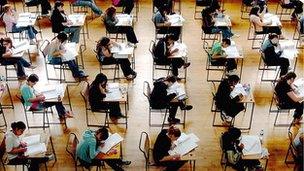WJEC staff suspended amid claims they gave teachers 'unfair advice'
- Published

Undercover reporters went to meetings run by exam boards used in English schools, including WJEC
The Welsh exam board WJEC has suspended two examiners amid claims some of its examiners gave teachers unfair advice on upcoming GCSE questions.
The Daily Telegraph said that it had filmed an examiner telling teachers at a paid-for seminar which questions to expect.
Welsh education minister Leighton Andrews has demanded answers from WJEC where an inquiry is under way.
The exam board said it was now considering redrafting exam papers.
The newspaper sent undercover reporters, external to 13 professional development seminars organised by boards used by English schools, where the Welsh exam board has become more popular in recent years.
It alleges that during these seminars, which cost around £120, teachers were given unfair information.
They claim they were "routinely" given details about future exams including questions, syllabus areas to focus on, and even the specific words or facts students must use to win marks.
It filmed a named WJEC examiner at one such seminar on GCSE history telling teachers that a compulsory question in the exam "goes through a cycle" or a pattern of questions.
He gives the subjects for the upcoming exam, adding: "We're cheating, we're telling you the cycle. Probably the regulator will tell us off."
Gareth Pierce, WJEC chief executive, told BBC Wales the key issue was whether the advice being given at the seminars was too specific.
Specific advice
"In the short term, those examiners have been suspended from their current duties with WJEC pending the investigation being completed," he said.
He said they hoped to complete the investigation within 48 hours.
"If we find that there has been a change in integrity, fairness of the exam, then obviously we would produce a new version of it," Mr Pierce said.
One WJEC examiner at a seminar appeared to give specific advice relating to which former US presidents candidates should study for GCSE history.
He told delegates he had received an email asking how much depth should be taught on Bill Clinton and George Bush.
"The advice is none," he said.
Kennedy
He added: "My advice is if you think presidents, think Roosevelt, obviously Kennedy, Nixon and Reagan."
Derec Stockley, director of examinations at WJEC, was asked by BBC Wales whether this was too much detail.
"Advice like that is sometimes given where there may not yet be enough historical sources," he said.
"It's may be easier to do Kennedy than Clinton for example.
"And such advice is not just given in these events, that's given in circulars and email bulletins to teachers across England and Wales."
Around 18,000 candidates in Wales and England sat WJEC's GCSE history exam in 2011.
In England, UK government education secretary Michael Gove has ordered an inquiry into the exam system in light of the revelations.
In a statement to the Telegraph, WJEC said the seminars confirmed longstanding guidance that had been issued to teachers since 2008.
Allegations of malpractice
Explaining the information given to teachers at such seminars, Mr Stockley added: "Advice on the notification of the issues to be assessed in examinations is often given while emphasising the importance of covering all necessary topic areas.
"The advice is available in the WJEC GCSE history teachers' guide. Educationally, we would say you teach the whole course."
A Welsh government spokesman said: "As the qualifications regulator for Wales, the Welsh government takes seriously all allegations of malpractice."
"We work with the regulators in England (Ofqual) and Northern Ireland (CCEA) to ensure that qualifications give a fair and reliable indication of knowledge, skills and understanding so that the public can have confidence in the qualifications system.
"The regulators are liaising with each other and the awarding organisations concerned to get a fuller picture of what has happened and will then take any appropriate action promptly and consistently across the three countries."
- Published8 December 2011
- Published7 December 2011
- Published13 May 2011